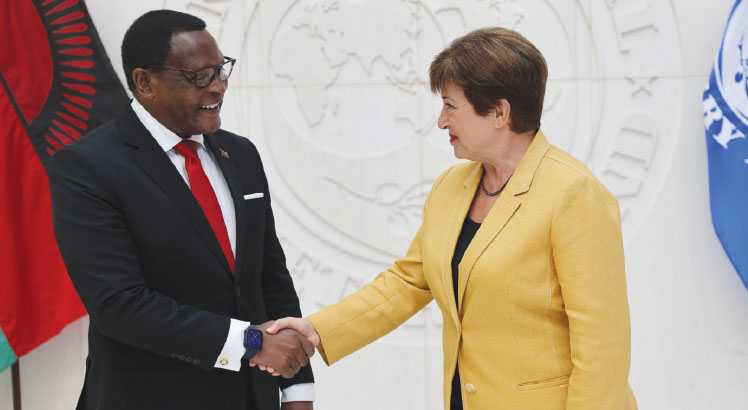IMF yet to be convinced
Malawi Government is yet to tick all the boxes for the International Monetary Fund (IMF) to approve the highly-sought Extended Credit Facility (ECF) programme and has since lobbied for interim reliefs.
In a statement issued at the end of its staff visit to Malawi, the IMF said its team discussed possible disbursement of funds under the Food Shock Window and a Staff Monitored Programme. The development means that ECF requirements such as debt sustainability and restructuring plan are yet to be fulfilled.
Reads the statement in part: “The authorities reiterated their commitment to steadfastly move to an Extended Credit Facility arrangement once sufficient progress has been achieved on debt restructuring process. IMF staff stands ready to support authorities in this endeavor.”

Led by IMF mission chief to Malawi Mika Saito, the fund’s team held discussions with Malawi Government representatives from October 5 to 8 on the Rapid Credit Facility (RCF) arrangement under the food shock window and Staff Monitored Programme (STP).
The RCF provides concessional and low-access financial assistance to low income countries facing an urgent balance of payments. It can also provide support in various circumstances, including external shocks, natural disasters, and other emergencies according to IMF guidelines.
The statement said the discussions were ongoing and will continue in Washington DC on the sidelines of the IMF-World Bank meetings scheduled for October 11 to 17 where the Malawi delegation will also be in attendance.
Saito described the discussions as productive and provided a veiled flicker of hope that Malawi stands a chance to clinch both the RCF and ECF which is crucial to invite more donors.
She said: “We had productive discussions with the authorities and made good progress on their request for a disbursement under the Food Shock Window of up to 50 percent of quota and the Staff Monitored Programme with Executive Board Involvement.
“The disbursement under the Food Shock Window combined with the Staff Monitored Programme would help address Malawi’s urgent financing needs and support reforms while providing the country with sufficient time to make progress on the debt restructuring process.”
But in an interview yesterday, economist Lesley Mkandawire said debt restructuring may require time and cast doubt that the ECF could be clinched any time soon.
He said the IMF statement also lacks clarity on what type of debt has to be restructured.
Mkandawire, who has worked for both Ministry of Finance and Reserve Bank of Malawi, said: “We cannot completely rule out a possibility of Malawi getting the ECF this year. Depending on the need and urgency, the IMF executive board can meet even this December to make a decision.
“What worries me is debt restructuring. It is not an easy process. It calls for more talks and negotiations. Unfortunately, there is even new debt which has come into the picture and to restructure that it may not be done overnight.
“For domestic debt, it is even more difficult because you are dealing with highly commercialised entities who may not easily accept certain conditions on account of their business. With that I really do not think we may get the programme in in the next few months.”
On the STP, he said it should not be a big issue because most countries with running programmes or discussions with IMF are put on such an arrangement.
In a separate interview, Minister of Finance and Economic Affairs Sosten Gwengwe said the discussions have this far been fruitful.
He said the tone from IMF was promising.
However, Gwengwe acknowledged that the debt restructuring requirement has dragged matters to this level.
He said: “So, the debt restructuring is the requirement for the ECF and it has dragged. The RCF is a bridging financing towards the ECF.”
The minister also clarified that the task at hand requires only restructuring of external debt.
In a written response, African Forum and Network on Debt and Development policy lead and head of programme Yungong Theophilus said the bridging finance will help Malawi use the resources to import food or offset balance of payments.
On debt restructuring, the specialist said transparency and accountability is key.
Theophilus said: “Negotiating is a good idea, but developing a pro-developmental strategy of absorbing resources will be key.”
In June this year, at the end of negotiations between the IMF and Malawi, the fund asked Malawi to work on two issues, notably conducting an audit of foreign reserves following misreporting of figures under the immediate past regime and management of unsustainable debt.
During this period, government had hoped the July IMF board meeting would approve the ECF.
Malawi is seeking a new ECF after cancelling the previous arrangement in September 2020 barely two months after the Tonse Alliance administration led by President Lazarus Chakwera ascended to power.
Through the cancellation, Malawi forfeited $70 million and total access under the cancelled three-year ECF was about $145 million, including the initial resource envelope of about $112.3 million approved in April 2018 plus $40 million under Augmentation of Access approved in November 2019.





